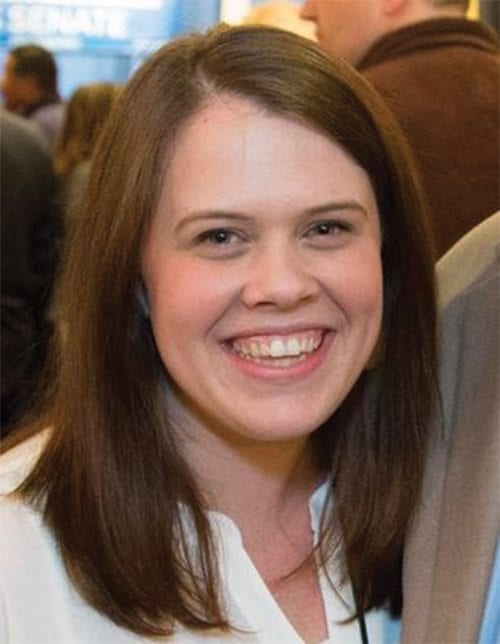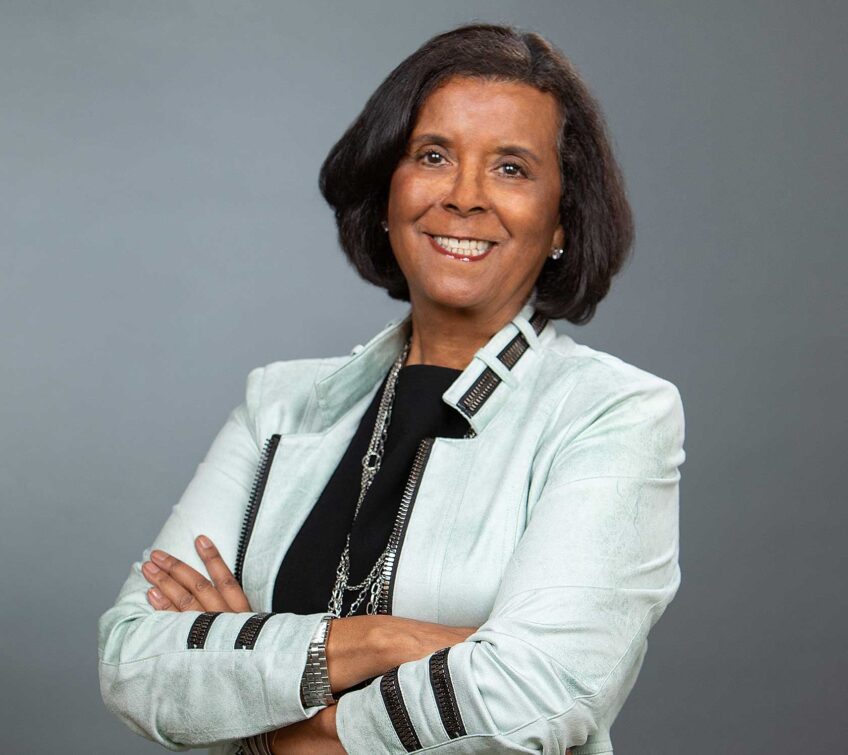
The new Boston Office of Women’s Advancement and the recently revitalized Boston Women’s Commission have a broad mission aimed at improving the lives of women and girls throughout the city in a number of different areas. However, for Boston’s businesswomen the first big target is increasing pay equity and making sure the city has greater opportunity for women entrepreneurs.

Megan Costello, executive director of the Boston Office of Women’s Advancement and chair of the Boston Women’s Commission. (Photo courtesy of the Boston Office of Women’s Advancement.)
Megan Costello, who leads the Office of Women’s Advancement as executive director and also serves as chair of the Boston Women’s Commission, said that in a city where women make up 52 percent of the population there is a social and economic need to ensure equal opportunities for women.
Costello points to the most current Employer Information Report, known as the EEO-1 Report, that shows Boston women make about 83 cents on the dollar compared to their male counterparts — numbers that the Office of Advancement and the Boston Women’s Commission are not willing to just accept.
Working with the Boston Women’s Workforce Council, the Office of Advancement has launched a data project this summer to find out what companies in the city are doing to make sure they advance women. The office is asking companies to sign on and look internally at the data and analyze what is effective in supporting economic equity for women and what needs to be fixed to remedy disparities.
While pay equity is often the first thing targeted, Costello said it is just part of the bigger picture.
“It is not just about the wage gap and raising wages, but it is about making sure there are other opportunities to make sure women can be successful,” she added. “We also have to consider the barriers that prevent women from leadership roles.”
By examining such issues through the Office of Advancement the hope is it will give a broader platform for the context of the impact on women.
“This isn’t about women saying we need this for us. This is women saying we need this for our families and we need this for the society. This is good for us all,” Costello said. “This is about companies making more money and being more profitable and at the same time helping to advance women and their families.”
The Boston Women’s Commission will also serve as a support system for women entrepreneurs and businesswomen throughout the city with its members serving as mentors.
The commission is not new, but in June it appointed new members for the first time in almost two decades in a move to revitalize its impact as a vehicle to support policy change that impacts women for the better. It is comprised of female and male leaders in business, academia and the nonprofit sector. With room for up to 30 members, 19 have been appointed so far.
Commission members have a wide range of experience that they can bring to bear as leaders in support of a new Boston for women and as mentors.
Members include: Alicia Canady Adamson, senior director of affinity programs and events at United Way of Massachusetts Bay and Merrimack Valley, and also founder of The Young Black Women’s Society Inc.; Marques Benton, vice president and director of the Office of Diversity and Inclusion at Federal Reserve Bank of Boston; Vanessa Calderón-Rosado, CEO of Inquilinos Boricuas en Acción; Diana Hwang, founder and executive director of Asian-American Women’s Political Initiative; Colette Phillips, president and CEO of Colette Phillips Communications; and Robert Rivers, president and chief operating officer of Eastern Bank.

Cassandra Campbell of Fresh Food Generation.
Fresh Food Generation co-founder Cassandra Campbell is also a member of the women’s commission. For her it offers a chance to tackle issues she is very passionate about.
“I have always been focused on equity across race, gender, class, age. And I like that the mayor is trying to create a more equitable Boston and is creating an arm of the city of Boston that is just focused on looking at women and making sure they have equal access in Boston,” Campbell said.
The Roxbury-native’s Fresh Food Generation is a company focused on providing healthy, affordable, cooked foods in low-income neighborhoods through catering services, as well as a food truck that serve on-the-go meals made with ingredients from local farms.
Campbell has a background in food justice advocacy, as well as community and economic development. She stressed she has a commitment to a better Boston, which is also served by her work with the women’s commission.
“The mayor’s commission really fits right into my vision, and wanting to work toward equity in Boston and a greater Boston — a Boston I want to see — and I can definitely make time for that,” she said.
As a startup entrepreneur, she also recognizes the need for a support system for young businesswomen and hopes she can help mentor others to chase their entrepreneurial dreams as she is doing.
“Being an entrepreneur can be tiring. It is not easy to do if you don’t have support around you, especially support from people who reflect you or can relate to you,” Campbell said.
According to Costello, there are almost 18,000 women-owned businesses in Boston and, in addition to supporting their effort, the Office of Advancement also wants to unite them in the push for greater economic equity for women.
Currently, the office has generated a list of about 1,200 businesses that it communicates with directly, but Costello wants to connect with all the women-owned businesses.
“We need to grow that number,” she said. “Also, asking businesses to help promote us so we can connect with more people is really important too. We are building a network right now. We are working on a foundation.”
Costello admits the overall task is not easy but the issues are serious enough to warrant a long-term effort.
“We know we are not going to solve the problem of pay equity in the next year but we need to find some concrete steps to start to solve the problem,” she said.
In addition to efforts to advance women’s equity, the Office of Women’s Advancement will also focus on understanding and reporting on the status of women and girls in Boston through data and research; and promoting women’s health and safety. The office will oversee and coordinate Mayor Martin Walsh’s initiatives to promote equal rights and equal economic, social, political and educational opportunities for all women and girls throughout the city.
Housed in the Health and Human Services cabinet, the Boston Women’s Commission will advise the mayor on issues pertaining to women in Boston.
“I am thrilled to have the Office of Women’s Advancement and the Boston Women’s Commission in place to help make Boston America’s premier city for women. I strongly believe that when women succeed, Boston succeeds,” Walsh said in a statement at the launch of the Office of Women’s Advancement. “I am particularly excited to have such a diverse and experienced women’s commission to work with me on this important issue. The equal treatment of the people of Boston impacts all of us — women and men alike — and with the new commission, we are bringing all these voices to the table.”






